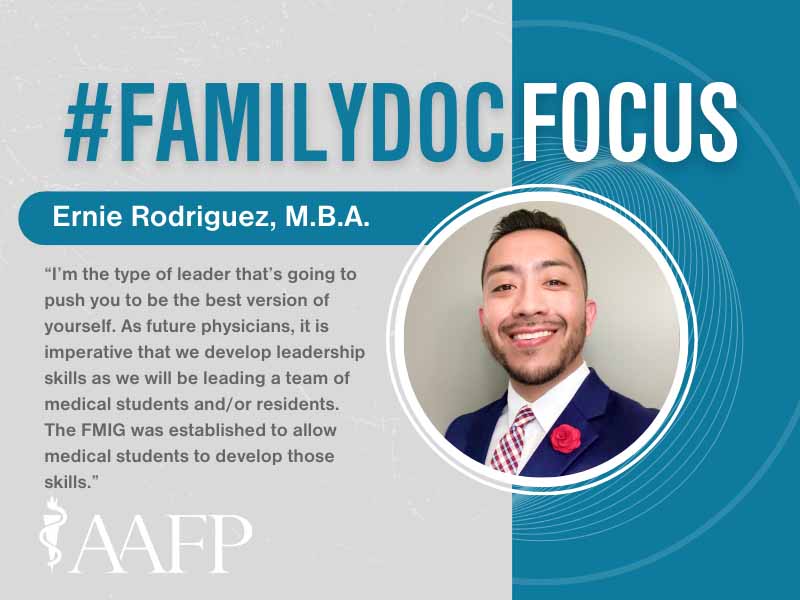Student Brings Businesslike Approach to FMIG
August 10, 2022, 4:03.m. David Mitchell (Kansas City, Mo.) — Ernie Rodriguez, M.B.A., worked at a bank to put himself through college and earned a degree in public administration. The day before graduation, he had a life-changing thought.

“Why not medical school?”
The why nots were plentiful for Rodriguez, a child of immigrants who was the first in his family to earn a college degree. He already had a job and was about to start an MBA program.
Rodriguez had always been interested in health care, he said, but he didn’t have the proper guidance in high school or college to pursue it.
He plunged ahead anyway.
“It doesn’t matter your upbringing or your age,” said Rodriguez, 35, a third-year student at the Universidad Autónoma de Guadalajara School of Medicine in Guadalajara, Mexico. “If you want to be a doctor, pursue your dreams. Don’t have ‘what if’ moments. Open the doors to opportunity for yourself.”
After earning his undergraduate degree from the University of La Verne in California in 2011, Rodriguez worked in banking and later insurance while also pursuing his M.B.A. In 2012, he started a postbaccalaureate program at the Southern California University of Health Sciences to prepare for med school.
He worked full time Monday through Friday, worked on an M.B.A. at his own pace online and took SCU classes for 10 hours on Saturdays and Sundays for two years.
“It was an intense program,” said Rodriguez, who also found time to shadow emergency room physicians. “I took one year of biology in a month. It was crazy. I don’t know how I did it.”
Rodriguez said he drew inspiration from his parents’ hard work, sacrifice and perseverance.
“They have shaped me into the man I am today,” he said. “Their words always give me the drive to never give up and work hard in everything I do.”
Still, Rodriguez didn’t rush to medical school, instead working six years in the insurance field.
“I wanted to enjoy life, travel and be financially stable,” he said. “I wanted to have life experiences and not go into medical school at age 22 without experiencing adulthood. I thought it would make me a better applicant.”
Rodriguez said his M.B.A. and business experience will help him in health care.
“I plan to go into private practice,” he said. “With an M.B.A., I can manage my own team. It taught me leadership skills and the fundamentals of running a business.”
Rodriguez already is putting those skills to use in medical school. Last fall he started a family medicine interest group at his school, work that included launching a website and newsletter for the FMIG and developing a peer mentorship program. The FMIG held 35 events in its first year, covering topics like mental health, advance directives and writing a curriculum vitae, as well as numerous clinical skills workshops.
“We started with roughly 45 members,” he said. “We have more than 100 members now. We’re getting donations from both sides of the border to support our philanthropic work. I’m running the FMIG like if it was a business.”
The Universidad Autónoma de Guadalajara was honored as one of the overall winners in the FMIG Program of Excellence Awards July 28-30 during the National Conference of Family Medicine Residents and Medical Students in Kansas City, Mo.
Rodriguez, who received a Family Medicine Leads scholarship from the AAFP Foundation to attend the event as well as a scholarship from the Los Angeles AFP, presented in two sessions related to FMIGs during the conference.
“I learned so much about myself, including how to be an effective leader,” Rodriguez said of the past year. “I was introverted growing up. I don’t mind talking and doing presentations now. I’m the type of leader that’s going to push you to be the best version of yourself. As future physicians, it is imperative that we develop leadership skills as we will be leading a team of medical students and/or residents. The FMIG was established to allow medical students to develop those skills.”
After studying for two years in Mexico, Rodriguez will complete his clinical rotations in Nevada and his home state, California.
Rodriguez grew up in an underserved community in Los Angeles and understood before he entered medical school that minorities were underrepresented in the medical field. He said his interest in primary care was solidified during a rotation in Las Vegas with family physician Justo Sataray, M.D., and Sandra Noemi Sanchez, F.N.P.-C, who primarily care for an underserved population. He said that exposure to various diagnoses, procedures, treatments and the physician-patient relationship led him to apply to family medicine residency programs in 2023.
He hopes to return to California to practice.
“My plan is to go back there,” he said. “I would love to be near the L.A. area, but I’m very open. Life is an adventure. You go where the wind takes you. That’s how I’ve been living life.”